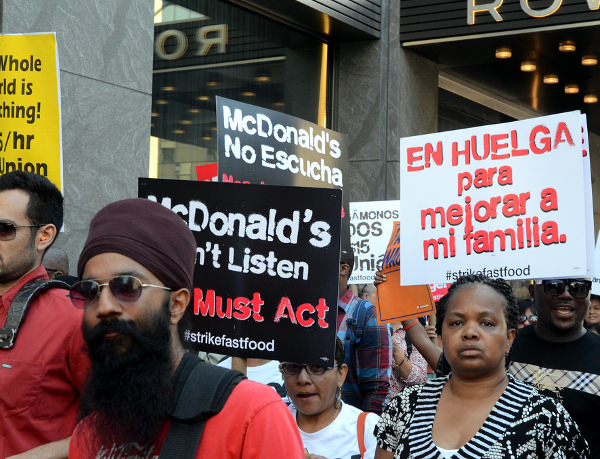
PHOTO/MICHAEL FLESHMAN
Fast Food worker strikes are sweeping the nation. City after city documents the impact of minimum wage workers taking a stand. The fight for fifteen movement, funded and organized by SEIU, has brought workers out in major cities like Atlanta, Boston, Charleston, Hartford, Miami, the Bay Area, New York and Philadelphia. Recently in Taco Bells, McDonalds, and KFC’s all over the United States, workers walked out on the job, participated in coordinated civil disobedience and were arrested in city after city.
Over the past few years, we’ve seen the rise of many low-wage worker movements. The workers describe the harshest of economic conditions. There’s little to no health care and irregular hours with little to no control over one’s life. Management is abusive. The fast food workers strikes have resonated deeply with a population that is tired of working 60 hours a week only to need rapidly diminishing public benefits to survive.
As soon as the strikes emerged last year, articles began to pop up about European fast food chains replacing thousands of workers in a single technological stroke. In fact, most recently the Business Insider, along with various other publications, covered the invention of a hamburger-making robot that can produce over 360 sandwiches an hour! Indeed, we can imagine what type of abundance technology like that could produce for hungry families without the barrier of capitalist ownership of the socially necessary means of life. We can also imagine how many workers in this industry are going to permanently lose work and theirlivelihood as technology replaces labor.
The situation of the fast food workers—the low wages, the just-in-time scheduling, the threat of being replaced by robots—is a harbinger of the future for all workers. Labor-replacing technology is eliminating jobs and driving down wages worldwide. The fast food workers are part of a global section of the working class that is forced to confront an economic system that can no longer meet their needs.
The same technology that is wiping out jobs and driving down wages could end poverty forever if the people owned and controlled it in a cooperative society. In such a society the necessities of life would be distributed to all based on need, not money. The computer and the robot spell the end of economies based on private ownership of the means of life. We cannot fix a dying system. If we keep the vision of a new society in mind as we fight, that will keep the struggle on course.
In pointing the way forward, Jeanina Jenkins, a McDonald’s employee in Ferguson, MO said she believes the police brutality protests will be on the minds of many striking fast food workers. “We’re fighting for the same thing, basically,” she said. (MSNBC)

